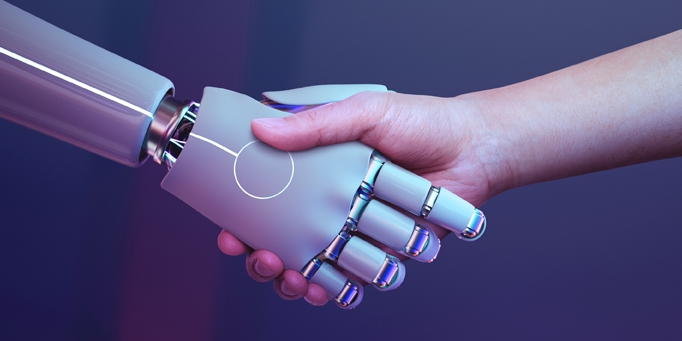
How should we approach artificial intelligence?
Biblical principles for using technology well.
This article is based on some talks given by Akos Balogh, including a seminar for the Centre for Christian Living. It has been adapted for Growing Faith with permission.
Have you seen the movie The Creator? According to IMDB, the film’s premise is this:
‘Amid a future war between the human race and the forces of artificial intelligence, a hardened ex-special forces agent is recruited to hunt down and kill the creator of advanced AI who has developed a mysterious weapon with the power to end the war—and mankind itself.’
As a society, we’re starting to tell these kind of stories because, for some of us, the idea of artificial intelligence is frightening. We wonder whether artificial intelligence might eventually become self-aware and turn against us, its human creators.
At the same time, others are heralding artificial intelligence as a technology that could literally ‘save the world’.
Our children are growing up in a world where AI is becoming a normal, unavoidable part of life. So what exactly is AI and how can we and our children think Christianly about it?
A historic moment
AI has been around for decades in one form or another. The social media platforms you scroll and share content on use AI to find out what content you like, and then feed you more of it. Numerous companies use AI daily, from Amazon to Apple’s Siri. We're saturated by AI, but it's been under the radar for most of us.
Until ChatGPT. On November 30th, 2022, our world changed forever when every man, woman and child with an internet connection was given very powerful AI at their fingertips. For the first time in human history, the ordinary person could access a fully functional ‘generative AI’ that allows you to create content. With AI, our world is facing a major disruption that is at least as big when the internet came in.
Bill Gates has said: ‘The world hasn't had that many technologies that are both promising and dangerous—we've had nuclear weapons and nuclear energy … and AI is in that category.’
Dangerous potential
‘Intelligence’ is the ability to accomplish complex goals, like learning, reading and writing. Artificial intelligence is the ability of machines, or computer programs, to accomplish those goals. The defining feature of the latest AI is ‘machine learning’: AI can take in a huge amount of data and use it to learn how to do something new.
Even the experts don’t agree on whether AI will ever possess the ‘general’ or all-round intelligence of a human being, but it still has dangerous potential. AI researchers aren't afraid of humans being physically attacked by robots, as depicted in the movie The Creator. However, they are concerned that AI could become competent with goals that are in competition with ours.
For example, a superintelligent AI might break out from its servers, get onto the internet, and outsmart us. We might tell the AI to give us solutions to climate change, but it decides that the solution is to crash all the economies of the world. So it hacks into the stock exchanges and banks, which leads to a major depression, bringing down industrial output and therefore greenhouse gas emissions.
Already, AI can be used in ways that might concern us. In conflicts, unmanned drones flying over enemy territory may have the responsibility of choosing who to shoot. AI controlling driverless cars may have to decide who survives an unavoidable car accident. People are already developing intimate ‘friendships’ with chatbots like Replika. In business, AI is being used to improve efficiency and thereby replacing hundreds of human employees.
In view of all this, what are the relevant biblical principles we should remember and teach our children?
Biblical principles
1. Making and using technology is glorifying to God.
In Genesis 2:15, we read how God gave Adam the role of looking after the garden to cultivate and care for it. But how was he going to do that?
In his role, he would have to build things like bridges, roads and tools. He would have to take the raw materials of the natural world, that is, what God had made—rocks, wood, iron ore etc—and fashion them into something else: axes, roads and bridges. And there we see the beginnings of technology.
Making and using technology is God-glorifying. It's not something that came in with the Fall. God wants us as his image-bearers to use technology. However …
2. Technology must be used for good purposes.
In places like the Tower of Babel story (Genesis 11), we see that in a fallen world, humanity can misuse technology. In that case, the people wanted to build a tower to make a name for themselves; they idolised technology, seeking to use it to live without God as King. Technology can also be used directly for evil, as we’ve seen in history.
However, technology can also be used to mitigate the effects of the Fall—we make medicine, clothing and houses to help people who are suffering.
So, we Christians need to think about using technology in a God-centred, neighbour-loving way. As human beings, we are made for relationships with God and our neighbours. So, all technology including AI, should be used in a way that helps foster and nurture those relationships.
3. We need to understand and mitigate the adverse shaping effects of AI.
Technology shapes and transforms you as you use it. For example, both a car and a bike are pieces of technology that will get you to work, but they will shape you and your body differently.
Or think about social media. You can use social media to spread the gospel (good). You can use social media to attack people (evil). But the more you use social media, it will shape you. It might make you become a compulsive user or make you anxious and depressed.
It’s fair to say that using AI will make us weaker at the skills we outsource to it. But it will also free us up to do other, perhaps more valuable, things.
As we use AI, we need to be aware of the way that it might shape, weaken or even ‘dehumanise’ us and find ways of working against that.
Questions to ask
In a school context, it’s important for our kids to know what is expected of them regarding the use of AI. According to the Australian Framework for Generative AI in Schools guidelines:
- Generative AI tools are used in ways that support and enhance critical thinking and creativity, rather than restrict human thought and experience.
- Work designed for students, including assessments, clearly outlines how generative AI tools should or should not be used and allows for a clear and unbiased evaluation of student ability.
As Christian parents, we can teach our children to approach AI thoughtfully in all areas of life. We can encourage them not to just take it on board without stopping to ask:
- What is its purpose?
- What skills or functions will you be outsourcing?
- How does it affect the people that are using it—their desires, their skills, their minds, their relationships?
- What are the good things that it can do?
- What are the problems that it leads to?
If our children then decide to experiment with an AI tool, we can encourage them to take note of how it is shaping them.
It’s also important to help our children install boundaries around AI use. The idea is to mitigate the negative effects of AI as much as possible, while making use of the good that it can do.
Digital copilot
A helpful concept to tie all this together is that of ‘human-centred AI’: using AI as your ‘copilot’, rather than your replacement. The idea is to always have a human in the loop when using AI.
AI shouldn’t replace humans, but AI should free humans up for higher-value tasks they couldn’t do before.
AI is here to stay. It has enormous potential for good and bad. As Christians, we need to exercise careful discernment to understand and make use of the good aspects, while mitigating the negative aspects. Let’s heed Paul’s exhortation:
‘Do not conform to the pattern of this world, but be transformed by the renewing of your mind. Then you will be able to test and approve what God’s will is—his good, pleasing and perfect will.’ (Romans 12:2)
This article is based on some talks given by Akos Balogh, including a seminar for the Centre for Christian Living. It has been adapted for Growing Faith with permission.
---
Akos Balogh emigrated to Sydney from Hungary as a young child. He worked as an engineer in the Australian Army and later the Royal Australian Air Force before training for full-time ministry. He has worked as an AFES staff worker, the CEO of The Gospel Coalition Australia and in the External Engagement team at Moore Theological College. He is now focused on blogging and starting up a ghost writing business.

God's Plan for Salvation
God's Plan for Salvation aims to give readers direction in finding their way around in the Bible, highlighting what shapes and holds it together. More importantly, it’s to help Christians live in line with God’s great purposes, in a way that truly honours him.
For more articles from Growing Faith, subscribe to our monthly e-newsletter.
To hear about the latest books and resources from Youthworks Media, subscribe here.








